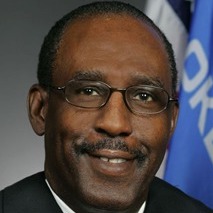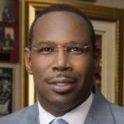 In May 2016 Raymond M. Burse, president of Kentucky State University in Frankfort, abruptly resigned his post. Shortly thereafter, Aaron Thompson was named interim president of the historically Black university. Dr. Thompson had been serving as executive vice president for the Kentucky Council on Postsecondary Education.
In May 2016 Raymond M. Burse, president of Kentucky State University in Frankfort, abruptly resigned his post. Shortly thereafter, Aaron Thompson was named interim president of the historically Black university. Dr. Thompson had been serving as executive vice president for the Kentucky Council on Postsecondary Education.
Thompson applied for the position on a permanent basis. Many in the community have lauded his performance over the past two years. Recently, the university reported that there are 2,096 undergraduate students on campus for the Spring 2017 semester. This is up 34.3 percent from the Spring 2016 semester.
Yet, when a field of three finalists to become permanent president of Kentucky State was announced, Dr. Thompson’s name was not on the list. And, according to published reports, members of the faculty, some alumni, and some state legislators were not impressed with the resumes of the three finalists selected. Travis Haskins, vice president of the staff Senate was quoted in the Lexington Herald-Leader as saying “These are the best candidates you can find? Something doesn’t sit well with me.” The Senate asked the board of regents to add Dr. Thompson to the list of finalists.
The three finalists announced by the search committee are:
 M. Christopher Brown, provost and executive vice president for academic affairs at the Southern University System in Louisiana. He is the former president of Alcorn State University in Mississippi. Dr. Brown is a graduate of South Carolina State University, where he majored in elementary education. He holds a master’s degree in education from the University of Kentucky and a Ph.D. in higher education from Pennsylvania State University.
M. Christopher Brown, provost and executive vice president for academic affairs at the Southern University System in Louisiana. He is the former president of Alcorn State University in Mississippi. Dr. Brown is a graduate of South Carolina State University, where he majored in elementary education. He holds a master’s degree in education from the University of Kentucky and a Ph.D. in higher education from Pennsylvania State University.




How about there’s more to the story–that the search firm and the committee did what they were charged to do. The outcome, in and of itself, does not show contrary evidence. It appears everyone has an opinion based on the spin that has been presented by those who have gotten the attention of the media. Btw, the search firm is used widely and is one of the best in the country. This situation is not about the search firm it is about some people not liking the outcome. I, too, like the Interim President a lot, however, if the purpose of the search was to only legitimize him, there would be no need for the search, a search committee or a search firm. Too often, that is the case–a lot of money is spent when search committees know who they want already–now this phenomenon should make taxpayers and everyone angry. I applaud the search committee for taking their jobs seriously and for sticking with a process that yielded the candidates they chose (Btw, the process was well publicized on the university’s web site). Additionally, just because a person may have resigned for a mistake or gotten a vote of no confidence at a former institution does not mean that they are no longer eligible to be an effective leader. Believe me, there are effective leaders who have made the same mistake and more and who are leading effectively today. Additionally, no confidence votes are not unusual when one is attempting to impact change, especially at small institutions. We need to trust that the search committee has done their homework. Kentucky State needs a leader who has strong academic qualifications to get it back on track. Let’s give the process a chance to work.